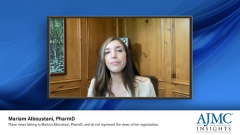
Indications for Adalimumab Biosimilar Therapy
Dr Oskouei explains the indications for adalimumab and the impact of their extrapolation, as well as differences among adalimumab products.
Episodes in this series

Sonia T. Oskouei, PharmD, BCMAS, DPLA: All biosimilars conduct pivotal clinical trials, which would result in extrapolation to include all the other indications of the originator biologic where applicable. What we see with the adalimumab biosimilars, the key pivotal trials have been conducted mainly in rheumatoid arthritis and/or psoriasis. These are indications where you have 2 different indications. Extrapolation is used here because adalimumab has a healthy list of indications approved for that product. You see extrapolation occurring where these adalimumab biosimilars would have the indications of the originator biologic, which would include dermatologic and rheumatologic conditions, as well as gastrological conditions like Crohn's disease and ulcerative colitis. The impact of extrapolation here is key to support the biosimilar use across all these indications.
Currently, we have 7 FDA-approved adalimumab biosimilars, and there's an expectation that there will be more. What's very interesting about the slate of candidates and the pipeline is that there are different quality attributes associated with several of these products. One, notably, is the concentration of adalimumab. The 7 FDA-approved biosimilars for adalimumab are currently for the original concentration of adalimumab. That's been on the market at 50 mg and is now considered the low concentration version. If you look at the market today, most of the utilization of adalimumab is with the higher concentration. It's interesting that we have this dynamic where adalimumab has evolved and has the high concentration version in the market, yet the 7 FDA-approved biosimilars were based on the original version because that's all that was available at the time and on the market. You have concentration differences there. You have different quality attributes like citrate-free, latex-free, the needle size. You could see all the different areas in which the biosimilar candidates may be going after certain quality attributes that may be viewed as more critical to market success vs others. Now, what's going to be interesting about all these dynamics is how much it will impact treatment and managed care decisions when it comes to coverage and policies. We also have a few candidates that are seeking interchangeability designation, and there's already one that has achieved interchangeability designation, Cyltezo. Again, we have another layer of consideration when it comes to use of these products. In the immunology space, the key strength of interchangeability will come down to having the additional data of switching scenarios with patients that could fuel and support clinical confidence in the switching scenario. I bring that up because in immunology, in order for these products to have meaningful market impact, there's going to be switches from patients that are on the originator to the biosimilar because these are chronic conditions. The new start opportunity in rheumatology is a lot smaller than what we've seen in different therapeutic areas, like in oncology where you have a lot more diagnoses and new starts. To have meaningful adoption and realize the potential of biosimilars and the meaningful cost savings that everybody wants to see, there's going to be clinical comfort in some of these scenarios that may require switching.
The extent of impact that the adalimumab biosimilars will have on the market and pipeline of biosimilars that fall more under the pharmacy benefit are going to be significantly influenced by the managed care landscape—meaning, how these products are reimbursed or covered from a formulary perspective can really make or break the opportunity that biosimilars have to bring cost savings to patients in multiple health care stakeholders and organizations.
Transcript edited for clarity.
Newsletter
Stay ahead of policy, cost, and value—subscribe to AJMC for expert insights at the intersection of clinical care and health economics.












